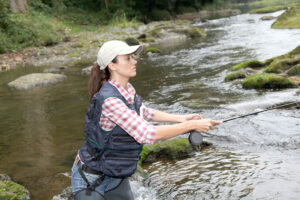Some FLY FISHING TIPS FOR BEGINNERS
from The Fishing Wire

Enjoy fly fishing
FLY FISHING GEAR FOR BEGINNERS
Before you can drift a fly you need some essential equipment. While there is a lot of gear out there, there is no need to feel overwhelmed. A rod, reel, and fly line is really all the fly fishing gear for beginners needed to get you started. Just keep in mind that it’s important to buy quality gear even if it costs a little more money. Poor gear leads to poor performance. In the long run, quality gear is a much better financial and mental investment.
PRACTICE, PRACTICE, PRACTICE
Even with quality equipment, learning to cast while trying to catch fish can be a bit frustrating. The good news is that you don’t need water to practice casting. Any place with enough clearance will suffice, like a backyard. Spend a few hours in the backyard with your gear, practicing one or two casts to have in your repertoire. Follow this tip and you will be far more confident casting during initial trips, which makes fly fishing for beginners that much more rewarding.
UTILIZE FLY SHOPS
There are a lot of aspects to a day of fishing such as the water quality, aquatic life, and access points. Local fly shops are where you’ll find your greatest resource for information. These guys and gals know everything about the local waters and are very generous with their knowledge. Do yourself a favor and learn from them.
AWARENESS
One of the greatest aspects of fly fishing for beginners is the beauty and serenity surrounding you. But while beautiful, bodies of water can also be hazardous, especially for anglers just starting fly fishing who may apply more of their focus to their flies than their surroundings. Water levels are prone to fluctuation, and rising water is dangerous. Stay on top of river conditions and always check before heading out. When fishing, always keep an eye on the water level, watch your footing, and be stationary when casting.
TIPS TO CATCH SOME FISH
There will be days where catching fish seems impossible. It happens to all of us, but here are some tips to limit those slow days.
Check what bugs are around and find a pattern that imitates them.
Cast upstream to places you think trout might be holding and work from the back of the hole to the front.
Fish seams in the current, obstructions that block current, and water transitions where fish often hold.
HANDLE FISH PROPERLY
If you plan practicing catch and release, it is important that you handle fish, especially trout, correctly. Your goal is to land them as quickly as possible. Playing fish until exhaustion decreases survival rates after release. If you must handle the fish with your hands, be sure they’re wet. Trout are soft-scaled fish and dry hands can cause abrasions and possible infections.
ENJOY THIS BEAUTIFUL SPORT
“Time spent on the trout stream does not detract from a man’s total life.” While not biologically accurate it does illustrate the feeling and spirit of fly fishing and how it can change your life for the better.
Content courtesy of The Fly Fishing Basics.